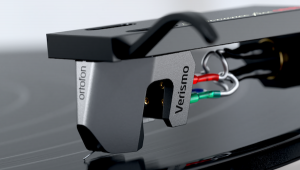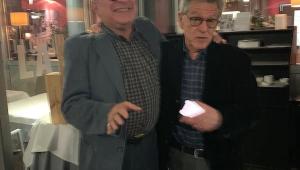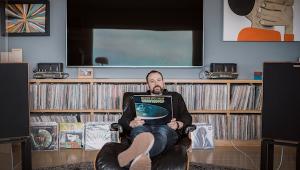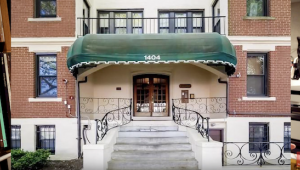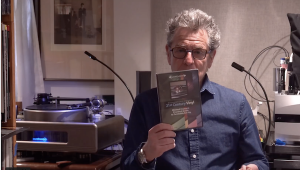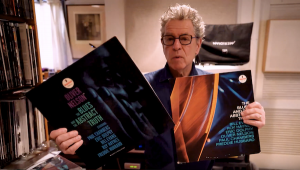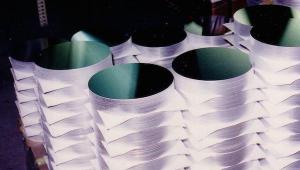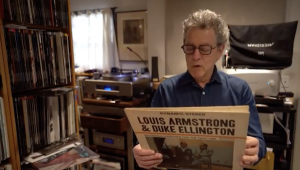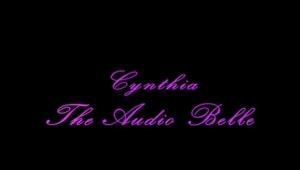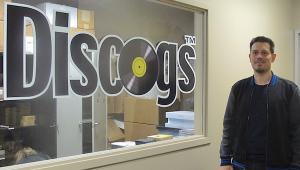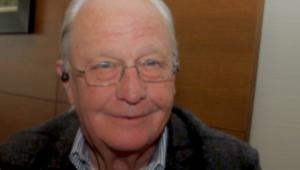Bill Porter Plays Favorites- An Elvis Presley Recording Session and More
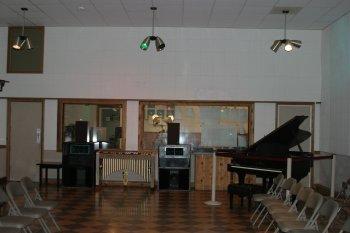
BP: I didn't pull out all the live recordings I've done. This is Homer and Jethro from 1962. Now at all the live recordings at RCA, Victor went to extreme lengths to modify the tape machines to increase the signal-to- noise ratio. And I copied some of those same principles in the studio back in Nashville. And primarily, it's putting in low noise resistors-everything is tube amplified, of course-in the front end and changing to a high-quality capacitor. So they usually were able to get the S/N ratio about 10dB better. You were telling me a while ago that you couldn't hear any hiss on my recordings. That's one of the reasons. And also you're not hearing third and fourth generations on my recordings. I didn't let them out the door that way.
1)Homer and Jethro: Live at the Country Convention (Produced by Chet Atkins, engineered by Bill Porter) RCA LSP-2492.

BP: That's a two-track mix as it occurred-no overdubbing, if ands or buts. That's as it happened. You don't get a rehearsal with these guys. It's wing-it time!..You know, we listen to all these different recordings, and these mult-miked recordings that originally go down to two-track tape maintain their phase coherency. That is not destroyed. When you go to multi-track tape and overdub, transfer around, mixdown, and equalize, phase relationships go out the window; and that's why the depth is missing on a lot of multi-track recordings. It's there on the two-track version because of the ambience that's normally there. And you can't re-create that electronically.
MF: It's almost impossible in the Eighties (when this interview was conducted) to make a recording that way.
BP: No. Nobody wants to play that way. Musicians have gotten-I don't want to say spoiled-they've gotten used to playing and correcting things. Playing just one time doesn't exist any more.
2)Floyd Cramer: “Swinging Shepherd Blues” Hello Blues (Produced by Chet Atkins, engineered by Bill Porter) RCA LSP-2151

BP: I picked that out because I held a workshop in Canada a few years ago, and one of the engineers in one of the studios there told me he had that record and that's what he used to check out the playback system. I said, “For what?” He said “Low frequency response on the bass-which we don't hear here-and the cleanness of the piano.” He said it was one of the best piano recordings he'd ever heard.
3)Chet Atkins: “Goin' Home” The Most Popular Guitar (Produced by Chet Atkins, engineered by Bill Porter) RCA LSP-2346

MF: That was amazing!
BP: All that stuff was done, of course, without any limiters or processors, at RCA Nashville. These were two-track mixes. What I normally did, though, on the featured artist, whether he was instrumental or vocal, was use a little limiting. I'd set the threshold rather high, at about two-to-one ratio, so it's the normal dynamics you're hearing.
MF: Why, you almost think you're listening to a compact disk! (said with a smirk).
BP: Well, mercy! Thank you!
MF: No, that's an insult actually.
BP: Well, I meant as far as frequency response and non-limiting.
4)Elvis Presley: “Stuck on You” Elvis' Golden Hits Vol.3(no producer credit, engineered by Bill Porter) RCA LSP-2765

BP: “Stuck on You” was, of course, the very first song Elvis recorded after he got out of the Army. The session was booked at seven o'clock on a Sunday night. Elvis showed up at about a quarter to nine. That's normal. And he always recorded all night long.
After the preliminaries-it was the first time I'd met the guy-I was impressed with Elvis as an artist, but I wasn't impressed with him more than anybody else. I'd cut a lot of big artists by then…At the very beginning of the first cut I sensed an eeriness in the control room,, like somebody's going to jump on you-like somebody's behind you watching and you justd want to look?
Finally, I did, and right behind me was Colonel Parker (Elvis' manager), Elvis, Steve Sholes (RCA A&R) and the VP from RCA, all looking like I made a mistake, they were going to grab me. It was that kind of thing. And as soon as we got the first cut finished, everybody sat down. Nobody said anything the whole time, because I was told later he hadn't sung in a studio in two years and they weren't sure what was going to happen. So, a lot was really riding on that cut.
We went ahead and did the next song, “Fame and Fortune,” on which he popped the mike a couple of times: in fact, he was popping it more than that. And I kept pushing the talk-back button, saying “Elvis, now you're popping the mike, back up, please.” And so after four or five times, he was getting up-tight and he started cursing. I figured I'd better not do it again, because he was losing his cool. So, you know, back then we didn't have roll-off filters on the console. It was pretty much as it was. It used to be the engineer's duty, if you saw a flaw, it's up to you to stop the producer and say “Hey, there's something wrong with this record, you can't put it out.” And, as you know, phonograph cartridges back then were real stiff and they wouldn't track those low-frequency notes. They'd skip. Well, here I am sweating, when I heard two mike pops. Is it bad enough? Do I let it go? Do I stop it? I'm sitting there weighing in the pros and cons. Well, I chanced it. You can hear them. But if it hadn't tracked, it would have been my rear end later on. But you'll notice when it comes out, it goes “ 'ame and fortune,” not “fame,” because he was popping the “f” so bad.
MF: You mean you had to splice it out?
BP: No, that's the way I had him do it. Now as soon as I got through-back in that time I was the only engineer-we didn't have any help. And I would edit off the master take as soon as we got through with it, while the musicians would work on the next song. And so I had these two cuts edited off the tape and the VP steps up and says, “I want those tapes.” I said, “No, sir, you can't have that.” He says, “Yes, I can have that, I'm flying to New York right now. We've already got presses waiting, that's his next release.” And so, obviously, I gave it to him. He took it and split. This was twelve-thirty at night and they had record back by Wednesday afternoon. They had the two songs already picked out. The label copy was all done, so all they had to do was press it!
One of Elvis's valets mentioned to me that they never got that kind of sound out of the RCA Nashville studios. I had kind of a reputation going for me by then, so Elvis was picked to record there and they wanted everything possible going for him. Steve Sholes didn't do anything but time the songs and take down master numbers. The sound is pretty much the way I thought it should be done.
Now, as you are well aware, that's entirely a different contrast to Elvis's previous recordings. Well, I wasn't pre-conditioned to his early stuff. I listened to it, but I didn't really pay attention to it. I was doing what I thought it should be. I saw a studio full of people out there and they're using two drummers and the only reason was D.J. Fontana was the original drummer for years with Elvis, and he was a loyal person to work with.
The guitar player was Scotty Moore, who stayed with him pretty much till the end. And this console, bear in mind, had 12 inputs-and all these people out there, and I'm saying, “How am I going to mike all these drums?” So I had put them up, side by side, and the second drummer basically is just on an overhead mike.
6)Elvis Presley: “Are You Lonesome Tonight?” Elvis' Golden Hits Vol. 3 (no producer listed, engineered by Bill Porter) RCA LSP-2765.

BP: This was done in one take. What had happened-as I mentioned earlier, I'd be taking off the master cut while the guys worked out the next song and so I'd always have the console set up for the last mix. I didn't change anything, so-I forget what song we'd just done, but before I could turn around to Mr. Sholes and tell him, “Okay Steve, I'm ready to go,” he said, “Roll the tape.” And I said, “But I haven't heard the song yet!” And he said, “Roll the tape, Bill!” and I look and the studio is totally black out there. I can't see a thing. I said, “You're kidding!” He said, “No, roll the tape!” So I said, “Yes sir!”
So, I roll the tape and I don't know what's going to happen. And a guitar starts off, and then a bass comes in, stuff like that, and Elvis starts singing. And I still can't see a thing in the studio. And I'm afraid to turn any mikes off because somebody may come in and start playing! I mean I don't know what kind of arrangement they've got going on out there! All of a sudden he stops singing and just starts talking. And I say to myself, “This is awful!” Because you don't normally put a lot of echo on dialogue. And I thought, next take, I'll just turn it down. We did the take all the way through.
The Jordanaires screwed up the ending, and he (Elvis) started to do it one more time. And he stopped and said, “Mr. Sholes I can't do this song justice, throw it out.” And I looked at Steve and he said, “Don't you dare throw that tape out, Bill.” So he pushed the talk-back button and said, “E.P., the Jordanaires messed up the ending, just do me an ending. I want to have one whole cut so we'll have it for posterity's sake.” So they backed up and did the last eight bars or so.
And Steve looked at me and said, “Now, when I leave, tomorrow, I want you to splice that together. That's a hit and I know it.” I said, “How about that echo?” He said, “Screw the echo, that's a hit!” I said “Okay.” He said, “I want you to use all the original, except right at the end, put thetag on.” That's just what I did.
MF: Did you save that little bit that was spliced out?
BP: Nah. Well, you know, you can look back and say that about a lot of things. As I left the studio, they had one of those big white (Nipper) dogs? And Elvis had signed it, and a bunch of other people too. And they tried to get me to take it with me. And I said, “I don't want that damn thing!” I kick myself now, obviously.
MF: Are you kidding? I'll kick you!
BP: Well, you don't know what's going to happen down the road. But getting back to the cut. If you listen to the dialogue, to what he says, the echo matches the effect, so I come out smelling like a rose. Because he says, “All the stage is bare, I'm standing here…” You could obviously get that kind of sound on a bare stage.



